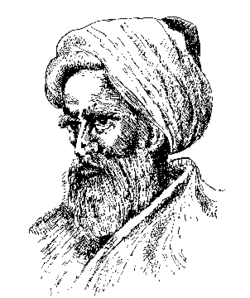Ibn al-Haytham
| Poetry of reality Science |
| We must know. We will know. |
| A view from the shoulders of giants. |
| —Neil deGrasse Tyson[1] |
Ibn al-Haytham (full name Abu Ali al-Hasan ibn al-Hasan ibn al-Haytham; commonly known as ibn al-Haytham, Ali al-Hasan, or in older texts as the Latinized "Alhazen"; Arabic: أبو علي، الحسن بن الحسن بن الهيثم) (c. 965 – c. 1040 CE) was a scientist from the Islamic Golden Age. Despite being virtually unknown in the modern West, he was an extremely important figure in the history and philosophy of science, as his experiments in optics were essentially the first step in the development of what would one day be called the scientific method.[2][3][4][5]
Book of Optics
His magnum opus was the Book of Optics (Kitab al-Manazir; Arabic: كتاب المناظر), a compendium of optical knowledge famous for, among other things, disproving the emission theory of vision![]() (the idea that our eyes project light onto objects rather than receive it, which was considered possible at the time). What is most impressive about this was his emphasis on rigorous experiment, rather than appeals to argumentation or reason. Al-Haytham was the first to describe a theory, make a prediction based on that theory, design an experiment which could refute it, and then carry out the experiment and successfully disprove it. In other words, he was essentially the first user of the scientific method, although the particulars would not be laid out until Francis Bacon some centuries later.
(the idea that our eyes project light onto objects rather than receive it, which was considered possible at the time). What is most impressive about this was his emphasis on rigorous experiment, rather than appeals to argumentation or reason. Al-Haytham was the first to describe a theory, make a prediction based on that theory, design an experiment which could refute it, and then carry out the experiment and successfully disprove it. In other words, he was essentially the first user of the scientific method, although the particulars would not be laid out until Francis Bacon some centuries later.
Scientific views
The following quote from his work Doubts Concerning Ptolemy illustrates this perspective nicely:[6]
Truth is sought for its own sake … Finding the truth is difficult, and the road to it is rough. For the truths are plunged in obscurity … God, however, has not preserved the scientist from error and has not safeguarded science from shortcomings and faults. If this had been the case, scientists would not have disagreed upon any point of science… Therefore, the seeker after the truth is not one who studies the writings of the ancients and, following his natural disposition, puts his trust in them, but rather the one who suspects his faith in them and questions what he gathers from them, the one who submits to argument and demonstration, and not to the sayings of a human being whose nature is fraught with all kinds of imperfection and deficiency. Thus the duty of the man who investigates the writings of scientists, if learning the truth is his goal, is to make himself an enemy of all that he reads, and, applying his mind to the core and margins of its content, attack it from every side. He should also suspect himself as he performs his critical examination of it, so that he may avoid falling into either prejudice or leniency.
External links
- See the Wikipedia article on Ibn al-Haytham.
- Ibn Al-Haytham: The First Scientist on YouTube
References
- ↑ "Hiding in the Light", the fifth episode of the American documentary television series Cosmos: A Spacetime Odyssey
- ↑ El-Bizri, Nader, "A Philosophical Perspective on Ibn al-Haytham's Optics", Arabic Sciences and Philosophy 15 (2005-08-05), 189–218
- ↑ Malik, Kenan (2010-10-22). "Pathfinders: The Golden Age of Arabic Science, By Jim Al-Khalili". The Independent. Retrieved 2014-10-22.
- ↑ Nomanul Haq|Haq, Syed (2009). "Science in Islam". Oxford Dictionary of the Middle Ages. ISSN 1703-7603. Retrieved 2014-10-22.
- ↑ Sabra, A. I. (1989). The Optics of Ibn al-Haytham. Books I–II–III: On Direct Vision. London: The Warburg Institute, University of London. pp. 25–29. ISBN 0-85481-072-2.
- ↑ Sobhi Rayan. Analogical reasoning roots in Ibn al-Haytham's scientific method of research. International Journal of Computational Bioinformatics and In Silico Modeling, 2014.
